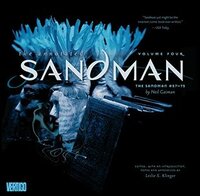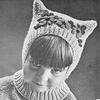Take a photo of a barcode or cover
Some stories were great and others were very boring. I'm tired of everyone "inspiring" Shakespeare. The death of dream was a good concept and parts of the story were interesting but a lot of faff and padding was used I'm also, at the end of this series, very tired with how much Neil Gaiman wants all the women naked.
The saga of The Sandman unfortunately goes out with a bit of a whimper. It's not that it isn't interesting, it's that it just drags on and on and on and on. Yes, all the loose ends are tied up, and Gaiman is a talented writer, but it felt like the storyline could have been about half as long and twice as interesting.
With that said, the annotations for this section were more helpful than some of the previous ones, with more information taken from Gaiman's notes and connections to the mythology and folklore. There's also a list of characters cross-referenced to their appearances and a timeline.
With that said, the annotations for this section were more helpful than some of the previous ones, with more information taken from Gaiman's notes and connections to the mythology and folklore. There's also a list of characters cross-referenced to their appearances and a timeline.
Separating out my opinion of the annotated work versus the original work is hard. Though it is hard to read because of its physical size, I like the form of this work - it captures the bigness of the series and this portion in particular which is the ending. In general I prefer color to black-and-white, but I appreciate the differentness of this version. There could have been more and more consistent annotations. My least favorite form were the full-length poems when the text just had an extract. The best was especially in the Wake, in which the reminders of who was whom was helpful.
dark
emotional
informative
reflective
medium-paced
Plot or Character Driven:
A mix
Strong character development:
Yes
Loveable characters:
Yes
Diverse cast of characters:
Yes
Flaws of characters a main focus:
Yes
Okay, I'm taking it down to one star for this one. There were SO MANY things that I noticed that ought--based on the previous volumes--to have had annotations, but did not. Some of these were even quoted poems and lyrics in italics, so there was no excuse for missing them. There were also a couple annotations that mentioned people or places who aren't readily known, like a British garden designer, but weren't explained. We also had some bizarre choices of which annotations to expand upon, like a note that spilled onto a second page because of an extensive quote about a frog found in a fossilized log that could have been summarized in a sentence or two. At least all the annotations were in the right place, unlike in those first two volumes.
That said, for nerds like me this volume did include some handy references: a list of every character in the series, a timeline of the entire series (alas that it does not include some of the later issues), and a list of existing books of collections with a brief summary of what's in them, which would have helped me realize that I'd actually been looking for the Absolute Sandman when I got the first Annotated Sandman from the library. Ah well, guess I'll check those out before the next season of The Sandman drops on Netflix.
Notes not related to annotations that I thought were missing:
> I really ought to read some Ben Johnson and John Webster, Shakespeare's contemporaries/followers. Webster's The White Devil and the Duchess of Malfi are described as "grotesque, near-Gothic stories," which are my kind of thing.
> Fascinating note about seventh sons/daughters of seventh sons/daughters being believed to have special healing powers.
> Quote from the ladies that Rose meets at the nursing home:
"A woman shouldn't <i>have</i> to sleep her life away. Women aren't about dreaming. We're about the <i>real</i> world."
"Even your grandma woke before she died. Women are about waking, Rose."
"As mothers we wake them from nothingness to existence."
"As maidens we wake them to the joys and miseries of adulthood, wake them to the worlds of lust and responsibility."
"And when their time's up, it's always <i>us</i> has to wash them for the last time, and we lay them out for the wake."
(Interestingly, that last part turns out not to be totally true for Dream. Elbis O'Shaugnassy lays Dream for his wake, and though Death, Delirium, and perhaps Desire are women, Destiny and perhaps Desire are men (though Desire may also be both or neither).)
> Another quote from an aspect of the Ladies:
Lyta: "I am seeking the Furies."
Crone: "<i>Not</i> the Furies, my Lobelia [the name isn't glossed]. That's such a <i>nasty</i> name. It's one of the things they <i>call women</i>, to put us in our <i>place</i>."
> And then there's this weird leap of logic that seems a bit much: One of the representatives from the necropolis of Litharge is named Moulder. Pretty obvious to someone familiar with the word why. But then Klinger adds speculation that it's also a tribute to Fox Mulder from the <i>X-Files</i>. Um...almost certainly not. The explanation is so obvious that I'm not going to believe that second speculation unless you have some kind of authorial proof.
> Klinger quotes a poem by Victorian poet Arthur O'Shaughnessy called "Ode" (which is terrible metadata), from his collection <i>Music and Moonlight</i>, which sounds like something I should look up.
Much better in annotating than previous three volumes. We get to glimpse at the way Gaiman ties back all the characters - both main and a few that have been in the periphery, and see how it all comes together in the end.
The ending isn't spectacular in any sense but its that is coming since the very first comic. Dream's unwillingness to change in the past had cost him relationships and when he finally starts to - just a little, it doesn't end well. He keeps well on his promise and its the promises he keeps that eventually culminates in his end.
The ending isn't spectacular in any sense but its that is coming since the very first comic. Dream's unwillingness to change in the past had cost him relationships and when he finally starts to - just a little, it doesn't end well. He keeps well on his promise and its the promises he keeps that eventually culminates in his end.

